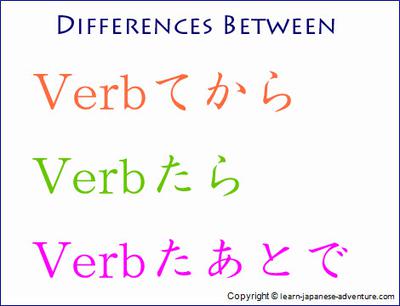- Home
- Learn Japanese Language FAQ
- Differences between verb te form kara and verb tara sentence
Differences between verb te form kara and verb tara sentence
by Daniel
(Singapore)

Differences between Verbてから, Verbたら and Verbたあとで
V1 て-form から、V2 (After) vs V1 た-form ら、 V2 (After)
A. 家へ帰ったら、すぐシャワーを浴びる。
I will take a shower soon after I return home.
B. 国へ帰ってから、父の会社で働く。
I will work for my father's company after going back to my country.
Why does the former sentence use "たら" to refer "after" and the latter use "から"?
What happen if I say:
A. 家へ帰ってから、すぐシャワーを浴びる。
B. 国へ帰ったら、父の会社で働く。
Is it still correct? Or is there a reason why one uses "たら" and the other uses "から"? On top of that, "たら" is also used when referring to "When" and "If", hence it is kinda confusing.
What happen if I say "いくら眠くても、日記を書いてから、寝ます。" and "いくら眠くても、日記を書いたら、寝ます。". Is there a difference?
Reply:
Hi Daniel,
Firstly, I have to apologise for the late reply. I have been quite busy with my work lately and was not able to post any new content on this site. When I finally had some time to look at your question, I was not sure about the answer. I did some research myself but was not satisfied with the answer.
In the end, I emailed one of my Japanese teachers who is still working in Singapore. As she was quite busy with her work, it took another few weeks before she replied me. Phew! At last, below is my answer with the help of my teacher.
①AてからB
A:Bの行動がいつ行われるかを伝えたい。強調される。
B:一回的な出来事、もしくは習慣的な出来事
(Aの時が来るまで、Bはしない…という意味も含む)
For this sentence pattern, the emphasis is that you want to convey the timing of when the action of B is being carried out. The action of B should be a one-time event or habitual event. It also contains the meaning that "The action of B will not be carried out until A happens.
◎家へ帰ってからシャワーを浴びる。
※例えば、今ジムにいます。今日はシャワーを浴びずに家でシャワーを浴びることにしました。
シャワーを浴びるのが「いつ」かを強調。
In the above example, you decided not to take a shower at the gym but do it at home instead. You emphasise on "when" you are taking the shower.
△ 国へ帰ってから父の会社で働く。
※私はこの文、何だか変だと思います。Bに長期的な出来事が入っているからだと思います。
The above example is a bit weird. As mentioned above, the action of B should be a one-time event or habitual event. However, B is a long-term event (父の会社で働く) in this example, which
花子のSMS「今、電話してもいい?」
◎太郎のSMS「ごめん、今ご飯食べてるんだ。ご飯食べてから電話するね。」
※後で電話するが、それは「ご飯を食べた後」である事を強調。
In the above example, Hanako sent a message to Tarou asking if it's fine to call (phone) him now. Tarou returned a message saying that he is having his meal right now and will call her after the meal. Tarou is saying he will make a call to Hanako later, but the emphasis is on "when" he will make the call, i.e. "after the meal".
②AたらB
A:きっかけ
B:そのきっかけで起こる事、行う事。特に、意志、希望、命令、依頼などが入りやすい。
(過去形は入らない)
For this sentence pattern, A is the cue or trigger for the event of B. B is carried out or took place due to A. B can be the speaker's will, hope, order, request, etc. However, take note that B cannot be in past tense.
◎家へ帰ったらシャワーを浴びる。
※日本人なら、「浴びよう」「浴びて」「早く浴びたいな」等を使うと思います。
In this example, native Japanese would use 浴びよう (intention), 浴びて (te-form), 早く浴びたいな (desire), etc instead.
◎国へ帰ったら父の会社で働く。
※これも同様。「働こう」「働くつもりだ」等。
Similarly for this example, 働こう (intention), 働くつもりだ (intention), etc should be used instead of 働く.
◎ご飯を食べたら母に電話をかける。
※これも同様。「かけよう」「かけてみる」等。
Similarly for this example, かけよう (intention), かけてみる (try), etc should be used instead of かける.
③AたあとでB
「AてからB」に似ていますが、「Aの後B」という時間の前後関係を客観的に伝えるだけ。
B:一回的な出来事、もしくは習慣的な出来事
Although you did not mention this sentence pattern in your question, I thought it would be beneficial to include it here too. This sentence pattern is kind of similar to the first sentence pattern: AてからB.
However, it's used only to convey the timing relationship (before and after) of A and B objectively. Similarly, the action of B should be a one-time event or habitual event.
◎家へ帰ったあとでシャワーを浴びる。
In this example, you are only conveying (the order of occurrence) that you will take a shower after you reach home.
△国へ帰ったあとで父の会社で働く。
※「AてからB」と同じように、Bに長期的な出来事が入っている為、変だと思います。
Same as the first sentence pattern: AてからB, it's weird to use a long-term event (父の会社で働く) for B in this sentence pattern.
◎ご飯を食べたあとで母に電話をかけた。
In this example, you are only conveying (the order of occurrence) that you made a call to your mother after your meal.
Based on the above explanation, in the last example of your question, "いくら眠くても、日記を書いてから、寝ます。" is fine. However, the other example is somewhat strange. "いくら眠くても、日記を書いたら、寝ます。". It would be better to use 寝よう, 寝たい, etc.
Hope this helps,
Kia Leng
Comments for Differences between verb te form kara and verb tara sentence
|
||
|
||
|
||







